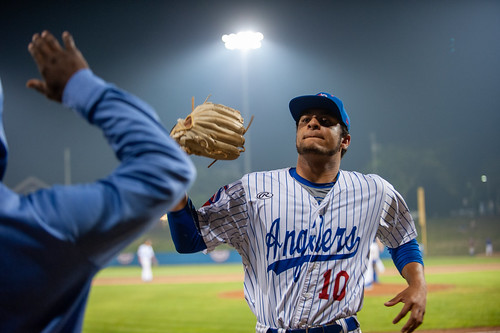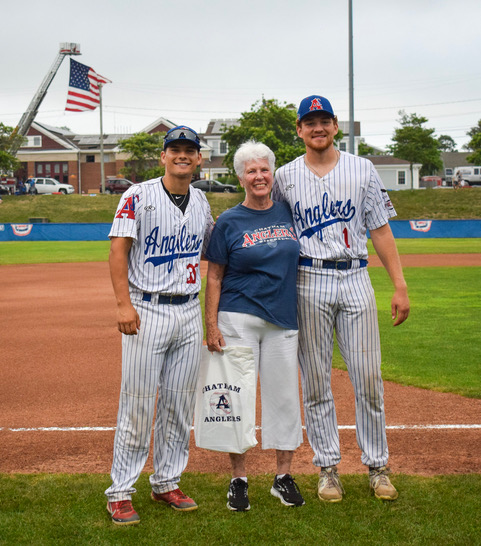Anglers News« Back to 2019 News Archives |
Luke Bartnicki's pitching delivery developed from his swimming background

Luke Bartnicki kept dragging his arm through his pitching release. His left elbow was bending too much and runners were reaching base too often. It was June 14, 2019, his first appearance on the mound for the Anglers, and Bartnicki knew exactly what was wrong: his arm motion.
The four walks allowed was proof. He was used to in-game complications, but not this one. In-between batters, there had to be a fix, something to stabilize his motion. Bartnicki thought about his arm motion, then his shoulder. What wasn’t working' His mind went back to swimming, more specifically the stroke that won him state championships before.
If Bartnicki could overextend his arm, mimicking a freestyle motion, he could get out of the outing unscathed.
“My arm slot is almost the same as when I swim,” Bartnicki said. “And swimming’s the reason I can make those adjustments in-game.”
Bartnicki balanced between swimming and baseball for more than a decade. Waking up at 4:45 a.m. to swim laps left him tired throughout the day. Late baseball games made his morning routine even harder. Winning meets complimented throwing no hitters in travel ball. Even when his parents decided it was better for him to pursue baseball more seriously right before high school, Bartnicki still swam competitively until he arrived at Georgia Tech.
But the intersection between the two was the reason coaches raved about him from a young age. Bartnicki throws 95 mph fastballs and looks like he’s “just tossing the ball.” He has the arm strength to go deep into games. Swimming wasn’t just his secondary sport. The motions, the endurance, the repetition were what molded him into one of the top pitching prospects in the country.
“A lot of people are like, ‘You swam' Where did that come from'’” Bartnicki said. “But everyone has their own methods. That's mine.”
• • •
Bartnicki towered over his competitors walking to swimming blocks at his local pool. He became a villain to parents as a young kid, he said, because their kids barely reached Bartnicki’s shoulder.
He won race-after-race, including a 25-meter freestyle state championship medal, until he was outperformed at nine years old. When Bartnicki asked how he could get faster, he was told to swim year-round.
“We were thinking Olympics,” David, Bartnicki’s dad, said.
He kept his focus in the pool. Baseball was the secondary sport then. But Bartnicki had a fastball that reached 70 mph before his teenage years. When he was 12, an assistant coach was the catcher of Bartnicki’s warm-up pitches.
On one pitch, the young pitcher threw a fastball that painted the top of the strike zone. The coach got his mitt on the ball, but he wasn’t fast enough to get it. It broke his eye socket. Bartnicki and David apologized profusely. But the coach just blamed himself.
“My reflexes are too slow,” David remembers the coach saying. “I can't catch this kid.”
Swimming always came with warnings from coaches: you have to work this hard and maintain your body at this level. Bartnicki remembers being told only a select few would make it. He’d have to commit his life to just that sport.
Baseball was more natural. Coaches said he had a flowing arm motion that looked poised for the majors. Even as a pre-teenager, several called him a “unicorn,” for being a fast-throwing lefty with a live arm. And because of his shoulder and lower back strength from hours of swimming a day, some said he had a “rubber arm.” There was no ultimatum, either, because most like the addition of swimming to his repertoire.

“I always thought I would be a better swimmer,” Bartnicki said. “But with everything these coaches were saying, it made it easy to choose.”
Before Bartnicki had to decide which sport he’d choose, he got an invitation to tryout for USA Baseball’s U-15 team. He showed up with an 87 mph fastball and left as one of the top left-handed pitchers in the showcase. Parents knew every player, some had “trading cards” because of their familiarity with each other in lower level select ball. After the exhibit, one of the parents went up to David and asked “How do we not know you'”
“At that point, we realized maybe there is something special here,” David said.
Swimming wasn’t an afterthought, but it wasn’t going to be Bartnicki’s path to a professional career. And Bartnicki liked baseball more, even if his parents didn’t always think it kept him fit.
The rising stock of Bartnicki as a top pitching prospect in Georgia still meant early morning drives to the pool. Fall became swimming heavy and spring was all about baseball. His high school swimming coach, Shane Amos, worked with Bartnicki to find time for laps, even if meant working with recreational adult swimmers.
But swimming wasn’t his focus anymore. Bartnicki would soon be the top left-handed pitcher in his class at one point — pegged to be seventh overall in the MLB Draft, he said. His motion looked like a horizontal toss and coaches would tell him to try and throw harder. That was just his motion, though, derived from his swimming techniques.
“He had a lot of power, but no control,” His mother Christy said. “But people kept going, 'He'll get it, he'll get it. But wow he's throwing hard.'"
A senior year where Bartnicki admitted he had a “dead arm” dropped the first-round hopeful “off the radar.” When he put his name in the MLB Draft, David remembers getting calls in the third and fourth round. But his son wanted to experience college.
He decided to stay home at Georgia Tech, but struggled in his first couple of outings. It took some time, but his ERA lowered and he became the Yellow Jackets’ closer by the end of the season. Three days a week, Bartnicki would wake up early and head to the pool. Nothing like his days of competitive swimming. But something to keep him active.
Eventually, word around the team got out about his past as a top-level swimmer. A couple of his college teammates asked to join him in the pool. Maybe it’d help their baseball mechanics, too.
• • •
The elongation of his left arm had worked — Bartnicki left the game without earning a run. But the walks stuck in his mind.
“If there’s something wrong in my last outing, I’m going to make sure it never happens again,” Bartnicki said.
He checked his Trackman statistics, studying his pitch speed and movement. He threw weighted balls behind the mound to throw uphill and get strikes. It couldn’t just be his fastball to close out hitters, especially in the Cape League — he needed his secondary pitches to work.
Nine days later, Bartnicki returned to the mound against Bourne wanting to rebound. Change-ups ended up as first-pitch strikes. Against one hitter, his slider caused the batter to stumble out of the box twice. Bartnicki doesn’t normally count, but he left that 3.1 inning outing thinking he had racked up three or four strikeouts.
When he returned to the dugout, pitching coach Dennis Cook gave him the news: seven strikeouts through 10 outs.
“Guess I did better than I thought,” Bartnicki said postgame.
The next day, Bartnicki rotated his shoulder around 3 p.m. There was no recovery lap or swimming meet like before. When asked how he was feeling after pitching his longest outing since high school, Bartnicki laughed.
“I got another 100 pitches in me,” he quipped. “It’s the swimming strength.”



